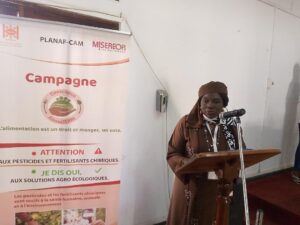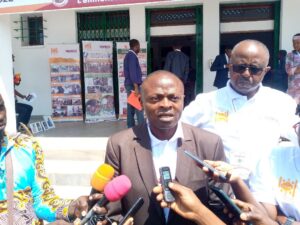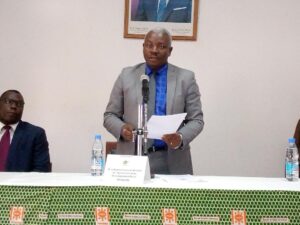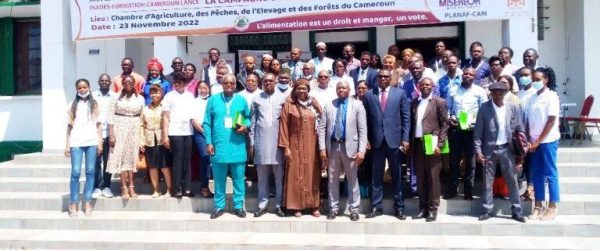Inades-Formation Cameroon launched the “Conscience AlimenTERRE” campaign on November 23. The launching ceremony took place at the Chamber of Agriculture, Fisheries, Livestock and Forestry of Cameroon in the presence of administrative authorities, technical and financial partners, NGO partners, media, farmers’ organizations and the general public.
Placed under the high patronage of the Ministry of Agriculture and Rural Development, the launching ceremony was chaired by the Inspector General in charge of agricultural development of the said ministry, Mr. ONDOUA Manga Tobie. He was accompanied by Mr. MAINA Amadou, Coordinator of the National Program for Food Security Watch and Reinforcement (PNVRSA). It was also noted the presence of Mrs. Elisabeth ATANGANA, Special Ambassador of the FAO for cooperatives and also, Messenger of the Campaign, the Representative of the Institute of Agricultural Research for Development, Dr. BEGOUDE Didier.
During her speech, the FAO ambassador for cooperatives invited people to say “NO” to chemical pesticides and fertilizers and to say “YES” to agro ecological solutions.

The general objective of the AlimenTERRE Consciousness Campaign is to raise the awareness of the different socio-professional categories on the issue of the right to food and the impact of the choice of our food and to arouse the commitment of all to the use of practices and inputs that respect the environment and human health.
Indeed, the right to food is the right of every citizen to have regular, permanent and free access, either directly or by means of monetary purchases, to quantitatively and qualitatively adequate and sufficient food corresponding to the cultural traditions of the people to which the consumer belongs. This right ensures a psychological and physical life, individual and collective, free of anguish, satisfying and dignified. The right to food therefore implies access for all, in a sustainable manner, to sufficient and healthy food.

According to the National Director of Inades-Formation Cameroon, Mr Alain LEKEULEM: ” When we talk about the right to food, we must consider the accessibility, availability, sustainability, and even the quality of the food we eat. The analysis of the results of the study on pesticides in Cameroon revealed that in our agriculture there is an abusive and uncontrolled use of chemical products and/or synthetic chemical inputs that cause dangers to humans, the land and the environment. Through this campaign, the aim was to raise public awareness of the negative impacts of certain choices and behaviors on the right to adequate, safe and sustainable food for all.
Through the AlimenTERRE Consciousness Campaign, Inades-Formation Cameroon and its partners aim to bring the different actors of the food systems to become aware of the stakes of sustainable food production and to act for a healthy agriculture, which produces without destroying, by privileging the agro ecological inputs. It is also sought in fine, a better design and / or effective implementation of policies and programs conducive to the development of sustainable food systems in African countries, especially policies and regulations concerning access, use and control of essential productive resources, the emergence of a food citizenship allowing responsible food choices and behaviors conducive to the enjoyment by all of the right to adequate, healthy and sustainable food in a spirit of solidarity and territorial interdependence.
A study conducted in Cameroon in May 2021 in three production basins in the Centre region (Mefou-et-Afamba, Lékié and Mfoundi departments) revealed that, despite the good will of producers to use biofertilizers, there is a lack of skills. Therefore, as noted by Drs. Aimé Didier BEGOUDE, Head of Biodiversity, Environment and Forestry Division at the Institute of Agricultural Research for Development (IRAD), during the restitution of the results of the study commissioned by Inades-Formation Cameroon at this launching ceremony, “Everyone uses pesticides as they think. There is therefore a need for capacity building of users on good practices of pesticide use in order to reduce the risks of poisoning and contamination of food and the environment, and especially to promote agro ecological alternatives..
According to some informed observers, in this case Mr. Tobie ONDOA MANGA, Inspector General of Agricultural Development at the Cameroonian Ministry of Agriculture and Rural Development (MINADER), “It is urgent to review production methods so that Cameroon can continue to ensure the food security of its people and retain its “status as the granary of Central Africa. Our production is an important basis for the food of neighboring countries. For our own health, it is important that these products are of good quality. In order for them to produce money and enrich the producer, it is important to have access to certain particularly demanding markets.

The launch of this campaign is a contribution to the achievement of specific objective 3 of the Rural Sector Development Strategy/National Agricultural Investment Plan, SSDR-PNIA 2020-2030, relating to the strengthening of the resilience of production systems, the sustainable management of natural resources and the food and nutritional security of vulnerable populations in the face of climate change and other shocks The campaign is also part of the promotion of food systems based on family farming, especially in the context of the United Nations Decade for Family Farming (UNDAF, 2019-2028).
Marguerite MOMHA, Communication Inades-Formation Cameroon









